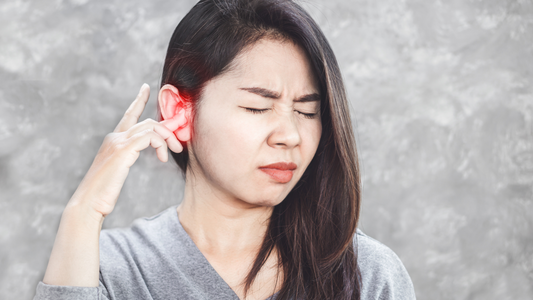Ever feel like there's a bell tolling just for you, but no one else hears it? Might be a case of tinnitus, the ghost ringing that buzzes your eardrums without any real-world sound. It’s more common than you’d think, especially as the years stack up. And, it’s not just about roaring concerts or working in a noisy shop decades ago. There's a truckload of reasons your ears might be ringing, and some might surprise you.
From the grind of daily life to the blueprints written into your DNA, tinnitus plays by odd rules. So take a seat and let’s chat, like we’re passing stories back and forth on the porch. We’re about to unpack some of the top reasons why those silent chimes might be kicking up a fuss in your head. And hey, don't fret if you're up against this pesky ring – there are ways to turn down the volume.
Understanding Presbycusis: Age-related Hearing Loss
Wonder why voices seem muffled at family dinners, or why the chirping birds aren't as clear as they used to be? It's not just you. Age-related hearing loss, or presbycusis, is a part of getting older for many folks. As we rack up birthdays, the tiny hair cells in our ears that send sound to the brain start to wear out. It’s gradual, so you might not even notice until you're asking people to repeat themselves more often. It happens to the best of us, and it’s as common as those gray hairs.
Think of your ears like a favorite old radio. Over time, it can't quite catch the high notes in songs anymore. That's similar to how presbycusis sneaks up on you, often hitting those high-pitched sounds first. Listen up, because here’s the deal:
- It’s natural: Just like wrinkles, it’s a part of aging. By the age of 75, about half of us will notice it’s tougher to follow a chat at the dinner table.
- It’s not the same for everyone: While your buddy might be missing the beep of the microwave, you might struggle to hear your grandkid’s latest joke.
- It’s not a lost cause: There are ways to manage it. Simple aids to massive leaps in tech have come a long way to turn the volume back up on life.
So if you find the world getting a bit quieter, you’re not alone. It’s just one more thing to share stories about over a cup of joe with friends.
Noise Exposure: Turning Down the Volume

Feel like the clamor in the world around has cranked up past eleven? Turns out, the roar of engines, the blast of construction, or even those rock concerts from your heyday could be nibbling away at your hearing. Noise exposure has a sneaky way of turning up the dial on your ears’ wear and tear, often leading to hearing loss or a pesky ring called tinnitus. And if you've been around the block, it's not just the decibels of today; it's all those years of accumulated hustle and bustle.
Here’s how this racket around us takes a toll:
- Temporary ring: That buzzing after a fireworks show might fade, but it’s a warning. Your ears are begging you, “Please, no encore.”
- Lasting change: Worked in a noisy job or lived by a busy street? Over time, this may lead to permanent hearing tweaks.
- The silent impact: Sure, loud sounds are culprits, but the constant, less obvious hums in daily life, they chip away at your hearing too.
The takeaway? Mind the noise now to keep tuning into life's symphony later. It could be as simple as popping in earplugs next time you fire up the lawnmower or choosing a quiet corner at the café. Because who wants to miss out on the punchline of that grandkid’s joke you love to hear?
Genetics: It Runs in the Family
Every family passes down something: grandma's china, dad's blue eyes, and sometimes, the tendency for hearing loss. It's true that the roots of our hearing ability often stretch back to our family tree. If you've ever wondered why you, but not your neighbor, have to turn up the TV, the answer might be locked in your DNA. Not just a roulette of traits, genetics can predispose us to tinnitus or hearing loss, sometimes in ways we don't anticipate.
- More than just ear shape: Those genes do more than determine if you've got ears like Uncle Bob. They can dictate your inner ear's resilience or vulnerability.
- Not just age or noise: It's not only about cranking up music in your youth. Your genes could have scripted this part of your saga long before you attended your first concert.
- Inherited conditions: Ever heard of Otosclerosis or Meniere’s Disease? These aren't just long words; they're potential family heirlooms affecting your hearing.
So if you're dealing with hearing hiccups and recall relatives with similar issues, it might be more than mere coincidence. Chatting with a doc and getting a hearing test could shed light on your family's auditory legacy. But don't worry, understanding your genetic soundtrack is the first step to turning the volume back up on those missed conversations.
Earwax Buildup: A Sticky Culprit
Had a moment of muted sound that made you pause? Often it's not a signal of anything severe but perhaps a hint of earwax buildup creating a sound barrier. Yes, that gunk - officially called impacted cerumen - plays defense against the daily dirt and debris. However, a surplus in your ear canal might just dampen the decibels, taking the edge off your favorite tunes or making conversation feel like it's underwater.
Navigating Through the Wax
- Simple to Sort: Unlike the irreversible effects of noise or age, a wax blockage is a fixable glitch in your sound system.
- Avoiding the DIY Pitfall: Tempting as it may be, keep cotton buds away from your ears – they often push wax deeper rather than clearing it out.
- The Professional Touch: Have a healthcare pro take a look. They've got the know-how and the tools to clear up that waxy buildup safely.
So if your ears feel like they're stuffed with cotton, consider that it might just be the work of too enthusiastic earwax. A quick check-up could have you unplugging that blockage and turning the volume right back up to the full, rich sounds of life around you.
Meniere's Disease: A Balancing Act
Spinning rooms and a constant ringing sound might not be your average dizzy spell, but a sign of Meniere’s Disease. This inner ear bugbear leads to some peculiar and unsettling symptoms, like sudden whirls of vertigo and a frequent roar or buzz in your ears - that's tinnitus tagging along. Typically, it creeps in, affecting only one ear and later possibly both. If these bouts of dizziness come double with hearing loss, Meniere's might be the uninvited guest to blame.
Wrestling With Vertigo and Tinnitus
Picture your inner ear as a finely tuned gyroscope keeping you steady; Meniere's throws a wrench into this delicate balance. The wrong kind of pressure inside your ear can make the world take a spin, often without any fair warning. This can make even simple tasks feel like you're navigating a carnival funhouse.
- Diagnosis Dance: More than a couple of dance-offs with vertigo? A proper diagnosis pairs up hearing tests with tales of your spinning episodes.
- Manage the Maelstrom: Too dizzy? Medications might steady the ship, while specialized vestibular exercises can retrain your balance, courtesy of ENT wizards or audiologists.
Remember, Meniere's might throw your world into a tizzy, but with the right moves, you can find your footing again.
Injury to Head or Neck: The Unseen Aftermath
It's not just jarring headaches or a stiff neck to worry about after a tumble or car crash. Sometimes, what's out of sight causes more trouble - like hearing issues. A conk on the noggin or a harsh jerk to the neck can rattle the delicate mechanics inside your ear. This can lead to hearing loss, ringing, or even a feeling like your ears are full. If you've had such a mishap and notice your hearing's off-kilter, it's worth getting it checked out.
Connecting the Dots Between Injury and Ears
- Sudden or Sneaky: Hearing woes can show up right after an injury or creep in slowly, days or even weeks later.
- Not Just a Surface Issue: Damaged nerves or a jarred inner ear don't always announce themselves with pain, but they'll whisper through muffled sounds or tinnitus.
- Get a Pro's Perspective: An audiologist or ENT can pinpoint if your tumble's left a mark on your hearing.
Take heart if you've had a bad knock and your ears feel out of whack. Often, with a bit of help, you can dial back in and not let an injury have the last word on your hearing.
Tackling Tinnitus and Hearing Challenges Together
Whether it's the silent symphony of tinnitus, the uninvited whisper of age-related hearing loss, or the toll of daily buzz, know that hearing quirks come with their own set of tales. We've all got a story or two about when our ears play tricks on us or don't pick up the tunes of life quite like they used to. Remember, it's a shared journey, each with our unique soundtrack shaped by years of life’s symphonies and the occasional cymbal crash.
Yet, here's something hopeful to chew on: Hearing aids have become the unsung heroes for many, and they're nothing to shy away from. They're smarter, sleeker, and more discreet than ever. The HearWell Group's hearing aid could be just the sidekick you need to amp up those softened sounds. So, keep sharing your stories and let's tackle these challenges head-on, side by side. We're in this together, ready to hear every note of life's rich melody.
Sources & References
- Biswas, R., & Hall, D. A. (2022). Global prevalence and incidence of tinnitus: A systematic review and meta-analysis. JAMA Neurology, 79(8), 796-807. https://jamanetwork.com/journals/jamaneurology/fullarticle/2795168
- Bhatt, J. M., Lin, H. W., & Bhattacharyya, N. (2016). Prevalence, severity, exposures, and treatment patterns of tinnitus in the United States. JAMA Otolaryngology–Head & Neck Surgery, 142(10), 959-965. https://jamanetwork.com/journals/jamaotolaryngology/fullarticle/2533660
- Cima, R. F. F., Mazurek, B., Haider, H., Kikidis, D., Lapira, A., Noreña, A., & Hoare, D. J. (2019). A multidisciplinary European guideline for tinnitus: Diagnostics, assessment, and treatment. HNO, 67(1), 10-42. https://link.springer.com/article/10.1007/s00106-019-0633-7
- Nondahl, D. M., Cruickshanks, K. J., Wiley, T. L., Klein, R., Klein, B. E., & Tweed, T. S. (2002). Prevalence and 5-year incidence of tinnitus among older adults: The epidemiology of hearing loss study. Journal of the American Academy of Audiology, 13(6), 323-331. https://www.thieme-connect.com/products/ejournals/abstract/10.3766/jaaa.13.6.3
- Stohler, N. A., Reinau, D., Jick, S. S., Bodmer, D., & Meier, C. R. (2019). A study on the epidemiology of tinnitus in the United Kingdom. Clinical Epidemiology, 11, 855-871. https://www.ncbi.nlm.nih.gov/pmc/articles/PMC6815649/
- Zenner, H. P., Delb, W., Kröner-Herwig, B., Jäger, B., Peroz, I., Hesse, G., ... & Langguth, B. (2017). A multidisciplinary systematic review of the treatment for chronic idiopathic tinnitus. European Archives of Oto-Rhino-Laryngology, 274(5), 2079-2091. https://link.springer.com/article/10.1007/s00405-016-4401-y

The Hear Well Group Research Team: Trusted Hearing Health Insights
Our experienced research team compiles hearing health data from credible, peer-reviewed sources and presents it in easy-to-understand terminology. We ensure accuracy and trustworthiness, providing up-to-date, evidence-based recommendations to enhance hearing care practices and inform our readers' hearing well-being decisions.


